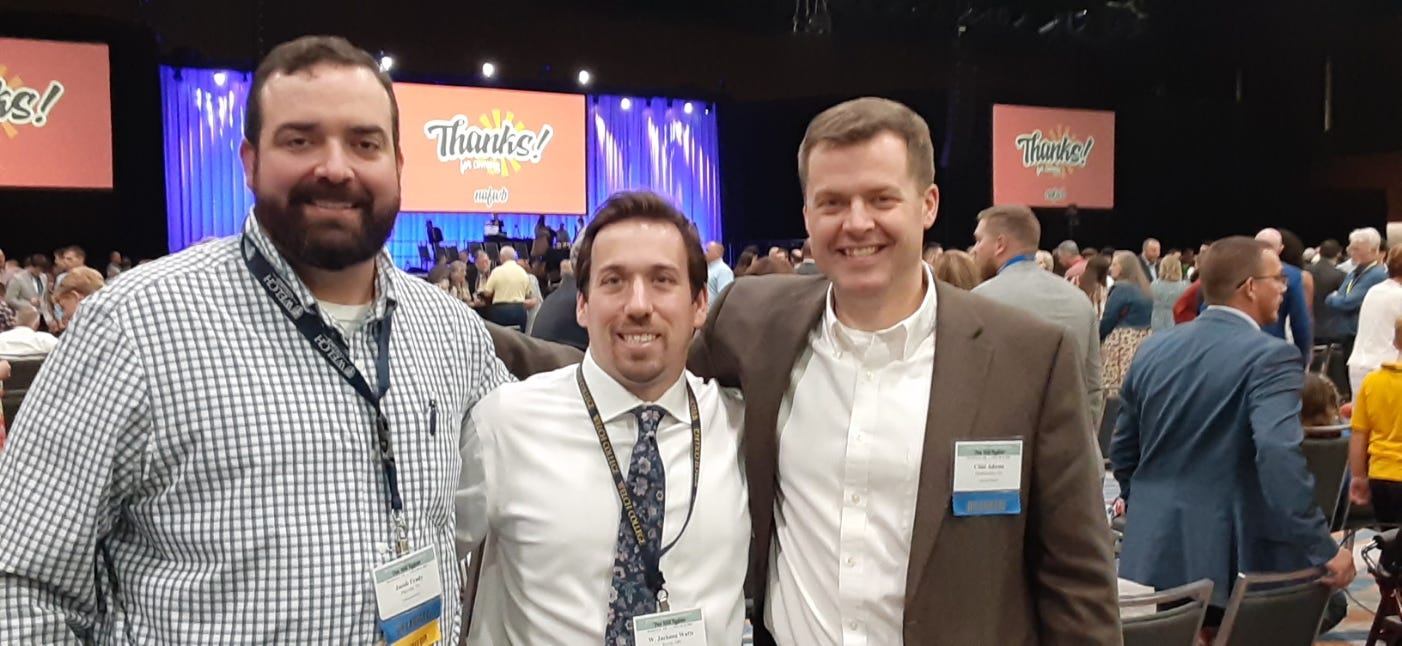It’s very important to put the apostrophe in the correct spot when you write about the wives of pastors. For example, steer clear of “pastor’s wives.” On the other hand, “pastors’ wives” is the way the go.
A Perspective on Ministry Wives
This past weekend a few dozen women attended the Missouri Ministers’ Wives’ Retreat. Among them was my wife. One of the things I have appreciated about serving in Missouri is how well my wife has been treated, both by church members and by other believers in the state.
Certainly, there have been difficult seasons and awkward moments. However, she and I can both sincerely say that we have been loved well. We have dozens of people in our church and across our state who we count as dear friends, with whom we have countless, cherished memories.
I believe this overall experience obligates me to speak up about how things have been. First, we should testify to God’s goodness and people’s kindness as a matter of giving thanks. Second, given how poorly pastors and their families have sometimes fared, it’s especially important for people to hear that it isn’t always this way (nor does it have to be!).
In the last year I’ve seen others, including the State Office and National Executive Office of my own denomination, take steps to provide support and encouragement for pastors and their families. Between articles, podcasts, online discussions, and events, people are responding to a need. I see this need as two-fold: (1) the need to resource and equip people for the unique ministry experiences they are facing or are likely to face; and (2) the need to compensate for where pastors and their wives have often been wounded through the travails of ministry and marriage.
Ministry is hard. Marriage is hard. But the combination of vocational ministry and marital life is potent. It contains all kinds of possibilities for blessing but also brokenness. I am especially grateful for the way men and women of good faith have chosen to lean into this area of ministry to ensure that people persevere in godly marriages and fruitful ministries.
Additionally, I’ve discovered that one of the best ways that ministry couples are ministered to—proactively and in the face of problems—is by having strong relationships with other ministry couples. This has been a source of immeasurable joy in mine and my wife’s life. I can summon to mind the faces of a few dozen precious couples. We ’re not equally close to all, nor do we see each of them with the same regularity. But collectively, we are blessed by their warmth and godliness. A threefold cord is not easily broken.
One Big Thing
Perhaps the most meaningful insight I have acquired over the decade I’ve been married while in ministry is this: it means more to me that people value, support, and bless my wife than they do me. In no way is this some sort of feigned modesty. Nor do I deny my own need for help and encouragement. But I am blessed by seeing my wife blessed, and in fact, it blesses me more than someone doing something for me directly.
There have been quite a few popular-level articles written about the ministry of being a pastor’s wife. Some have been more helpful than others. At the risk of summarizing a surprisingly dense subject, I want to offer a few key observations and suggestions. The observations simply reflect what I have noticed in a more pronounced way over the years. The suggestions reflect what I suspect is conventional wisdom for many readers, but too often overlooked.
First, some observations (in no particular order):
First, pastors’ wives are regularly saddled with unreasonable and/or unfair expectations about what their ministry should look like, typically based on what kinds of ministry a previous, beloved pastor’s wife fulfilled.
Second, younger pastors mostly don’t have the slightest clue about how best to prepare their wives for this and related problems they are likely to face.
Third, women who marry men who are called to pastoral ministry later typically experience the greatest difficulty in adapting to the unique experience of being married to a pastor.
Fourth, pastors often derive more satisfaction from helping women in the church grow than their own wives. This is both misplaced and dangerous.
Fifth, the Bible doesn’t define the role of pastor’s wife anywhere. At best, it only indirectly requires or implies certain things that are congenial to being the wife of a pastor. Specifically, she must agree with and support her husband’s gifting and calling to pastoral ministry.
Sixth, as an extension of number five, the most sweeping thing that could be said relative to a requirement of being a pastor’s wife is that one should be an example of godliness in the home, church, and world.
Seventh, if churches treated the wives of their pastors more charitably, they would see the typical tenure of pastoral service increase.
Now, some suggestions:
First, pulpit search committees should find ways to include the prospective pastor’s wife in the interview process. She should be present for key parts of it, both in being asked more about herself and her perception of her husband’s gifting, and she should have time for her questions to be answered.
Second, pulpit committee members and other lay leaders should be intentional to head off misplaced expectations about an incoming pastor’s wife, in terms of her personality, gifts, and how she intends to best serve her family and the church.
Third, a man who pastors should be intentional in finding opportunities for his wife to be served. Retreats, conferences, seminars, books, and other tools for edification should be identified and provided.
Fourth, a man who pastor should publicly communicate, through word and deed, that his wife is the most important woman in his life.
Fifth, such men and their wives should be proactive in forming healthy relationships with other ministry couples—ones who are more mature and experienced, and ones who are younger and likely need guidance. Ideally, they would have such relationships with people in different denominations and of different nationalities. This will only heighten one's awareness and deepen their perspective of the true nature of their work.
Sixth, pastors’ kids should be positioned to benefit from the blessing of having lots of adoptive aunts, uncles, and grandparents. Especially if they live far from family, children will be able to glimpse the beauty of the family of God.
Finally, ministry husbands and wives should assume that when things are going well in the church, Satan is busy targeting their spouse and children.
Thank God for good wives, mothers, and those who encourage and support them.
Follow-Up:
In last week’s newsletter, I reflected on the experience of purchasing a Bible. As I did, I was mindful of the global situation of Christians with little to no access to Bibles. Yet now, here’s a bit of good news. A partnership between two ministries intent on producing 20 Bible translations for oral-based societies is on track toward its goal. It’s very interesting and encouraging news.
Currently Reading:
Cornelius Van Til, Common Grace.
Quote of the Week:
Citizens do, in fact, have fundamentally different conceptions of what is just, right, and good. These are the sorts of issues that are exceedingly difficult to resolve. I have called this phenomenon “existential politics”—the heightened state in which political competition becomes anchored around identity rather than policy. If this existential tenor reflects real foundational divides over ultimate questions of the Good, then it cannot—and probably shouldn’t—be wished away, papered over, or transcended. After all, how can you “transcend” deep differences if they are deep enough that they can’t be transcended? Too often, we are beholden to the fantastical idea that with the right knowledge, the right information, and the right intentions, consensus can be reached among “reasonable” people who duly exercise their reason. As a matter of observed reality, however, this is quite obviously not the case—certainly not in large ethnically and religiously diverse societies such as our own. It might actually be closer to the opposite. It is precisely when we are being reasonable that consensus can drift further out of reach.
Shadi Hamid, “Division May Be All We Have Left.”






